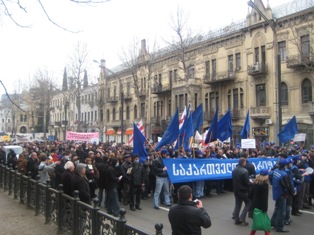Rebel of Workers in Zestaponi and Chiatura Ended With Temporary Truce with the Administration
April 28, 2010
Tamata Kakauridze, Zestaponi

The mass strike and protest demonstrations, which started on April 20 against Georgian Manganese Ltd in Zestaponi and Chiatura came to an end. The factory administration and the initiative group of the strike committee started negotiations since April 27.
One of the members of the initiative group Goga Bregvadze said the negotiations shall finish before June 15. The results of the negotiations shall be weekly reported to the employees of the enterprises of the Georgian Manganese Ltd.
“Those people shall decide whether the agreed issues between the administration and the initiative group are acceptable for them. If the administration does not resolve the problems in favor of the people, we will continue our protest,” said Goga Bregvadze in his interview with humanrights.ge
Before April 25, the administration of the Georgian Manganese Ltd was against negotiations with the strikers. They were particularly against involvement of the United Trade Union of Georgia in their affair. According to one of the main requests of the strikers, together with the Imereti Region Trade Union of Metallurgists and Miners the Trade Union of Metallurgists and Miners of Georgia, as well as the United Trade Union of Georgia should involve the negotiations; these organization defend the rights of the employees.
Before negotiations, on April 24, the administration of the Georgian Manganese sent an official statement to the strike committee. They claimed that the requirements of the strikers committee were groundless; the non-stop technologic cycle was dropped (Article 51 o-2 of the Labor Code), it caused problems for the enterprise and the state economy. Consequently, for the economical and entrepreneur security of the enterprise, because of the breached labor agreements by the employees participating in the strike, the administration would make decision in accordance with article 49 of the Labor Code which envisages refusal to execute the responsibilities imposed by the labor agreement; and from 4:00 pm of April 27, 2010 till 4:00 pm of April 28, 2010 every workshop of the Ferro Factory will announce warning lock-out unless the measures are taken before 4:00 pm of April 25, 2010 and the workers participating in the strike return to their work.
In parallel to it, as the administration stated, despite the warning lock-out, unless the strikers committee stop the strike and renew working procedures, they will have to announce long-term lock-out for three months without payment. At the same time, the energetic, fire and economical security measures will be taken to avoid accidents and damage of the property of Georgian Manganese Ltd.
Interim director-general of the Georgian Manganese Ltd A. Kupkov signed the decision of the administration. However, the administration did not have to take similar radical measures.
On April 25, Giorgi Kapanadze, one of the shareholders of the enterprise arrived to meet the members of the strikers committee. Initially, he was against the involvement of the United Trade Union of Georgia in the negotiations. Kapanadze requested to set up initiative group, which will not be subordinated to the United Trade Union. After that, the administration would have agreed to start negotiations; however, the strikers insisted on including the deputy chairman of the United Trade Union Gocha Aleksandria and chairperson of the Imereti Regional Trade Union of Metallurgists and Miners Tamaz Dolaberidze.
There were 7 members in the imitative group. They started the negotiations from April 27 and the results of those negotiations will be reported on June 15.
News
December 13, 2023
Ethnic minorities outside the peace dialogue
November 6, 2023
‘Peace’ agenda of political parties
Popular
Articles
February 13, 2024



